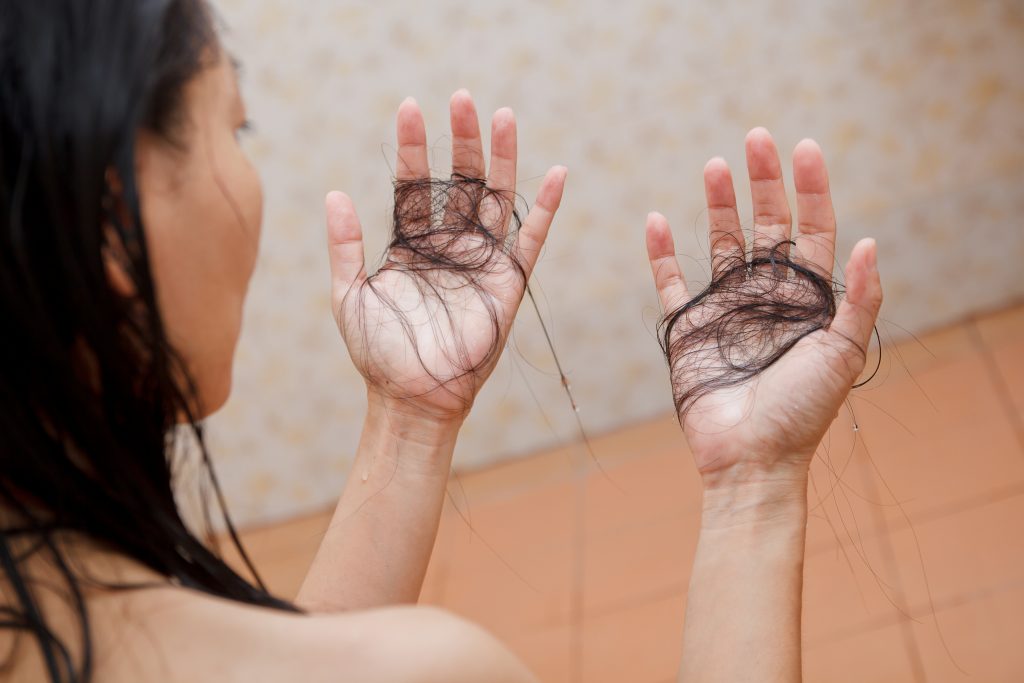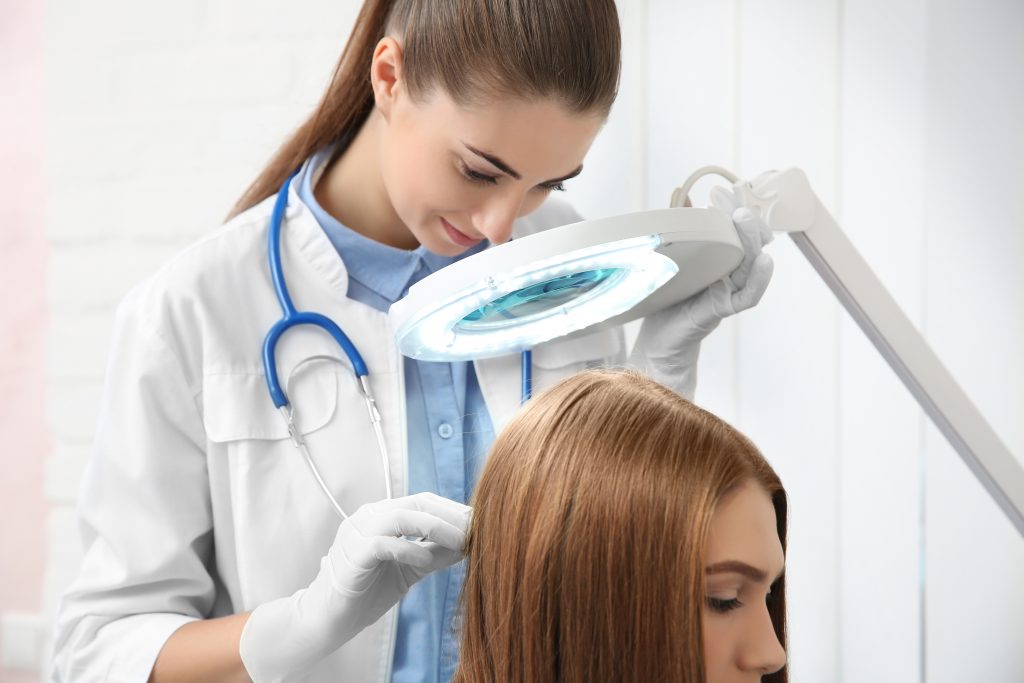June 17, 2021
Why is My Hair Falling Out?
Hair loss may be caused by genetics or by medical conditions, including diabetes and lupus. Certain medications and treatments may also contribute to hair loss, such as antidepressants and radiation therapy.
Knowing why your hair may be falling out can help you determine whether you should seek treatment or make lifestyle changes as needed to stop or slow hair loss.
How Much Hair Loss is Normal?
According to Cindi Peters, a family nurse practitioner with Healthcare Associates of Texas in Irving, “normal hair loss ranges from 50-100 hairs per day.” That is known as hair shedding and can occur when you bathe or shower, brush your hair, or when your pillow causes friction against your head while you sleep.
Hair grows and falls out in cycles, which is why it may seem as though you’re losing lots of hair after having a baby or experiencing a highly stressful event. This type of hair loss often remains temporary as the hair will usually grow back during the next growth phase.
Why is My Hair Falling Out so Much?
If it seems as though you’re losing way more hair than average, several factors could be triggering your hair loss.
Peters says, “patients can begin to lose hair at almost any age, from 20s-60s.”
The most common causes of hair loss are:
- Genetics and a family history of hair loss
- Aging
- Hormone changes and imbalances, such as that which occurs during pregnancy, menopause, andropause, and childbirth
- Medical conditions, including diabetes, lupus, thyroid disease, and ringworm
- Cancer treatments, including chemotherapy and radiation therapy
- Medications, including antidepressants, birth control pills, antibiotics, hypertension drugs, and nonsteroidal anti-inflammatory drugs (NSAIDs)
- Stress
- Hairstyles and hair treatments, such as tight ponytails and perms
- Sexually transmitted infections, including syphilis
- Nutritional deficiencies in zinc, protein, iron, and biotin (vitamin B7)
- Significant weight loss
- Exposure to poisons, including arsenic, thallium, mercury, and lithium
Peters adds, “The most common cause of hair loss is genetics.”
Why is My Hair Falling out in Clumps?
Hair that is falling out in clumps or handfuls may indicate that you have a scalp disorder triggered by one or more of the above factors. Experiencing a hormonal change or stressful event can cause hair to fall out in clumps, as can certain medications and illnesses.
“Losing hair in clumps can be caused by many different things, including chronic or inflammatory disorders, nutritional deficiencies, extreme calorie restriction, or crash diets,” says Peters.
Consult with your doctor right away to receive a confirmation on the root cause of your hair loss if your hair is falling out in clumps. Your doctor can review your medications and medical history and work with you to slow or stop hair loss.
Why is My Hair so Tangled and Falling Out?
 Factors that can cause your hair to become tangled include exposure to wind, washing hair roughly, or drying it vigorously with a towel. Damaged or thick and curly hair often remains more susceptible to becoming tangled and falling out. Excess exposure to heat (such as a hairdryer) and chemical treatments can also cause tangled hair and cause fall out.
Factors that can cause your hair to become tangled include exposure to wind, washing hair roughly, or drying it vigorously with a towel. Damaged or thick and curly hair often remains more susceptible to becoming tangled and falling out. Excess exposure to heat (such as a hairdryer) and chemical treatments can also cause tangled hair and cause fall out.
Talk to your hairstylist to gain tips on how to prevent your hair from becoming tangled and falling out if this happens to you frequently. Your hairstylist can recommend hair products that hydrate and repair damaged hair and show you how to style your hair in ways that won’t lead to tangles and hair loss.
Which Vitamin Deficiency Causes Hair Loss?
Several nutrients play a critical role in hair growth and hair follicle health. People who are lacking these nutrients in their diets may be more susceptible to hair loss than others.
“Deficiencies in iron, zinc, protein, and vitamin D can cause hair loss,” Peters explains.
Nutritional deficiencies linked to hair loss include vitamin A, vitamin C, vitamin D, vitamin E, iron, zinc, selenium, protein, and nearly all B vitamins—particularly B7. It’s possible that increasing your intake of these vitamins and minerals could slow hair loss or lead to hair regrowth.
Consult with your doctor before taking nutritional supplements to treat hair loss as other factors may cause it. Supplements may also interact with certain medications you take.
What Medications Cause Hair Loss?
Hair loss is a side effect of many types of medications. Some medications can damage hair follicles to disrupt hair growth.
“Medications that can cause hair loss include certain medications for blood pressure, seizures, cholesterol,” Peters adds.
Fortunately, any hair loss occurring when taking medications is usually only temporary and stops when you discontinue the medication.
Medications that may cause hair loss include:
- Acne medications, such as Retin-A and Accutane
- Antibiotics
- Antifungals
- Anticoagulants, such as heparin and warfarin
- Anticonvulsants
- Statins used to lower cholesterol
- Immunosuppressants
- Beta-blockers
- Angiotensin-converting-enzyme (ACE) inhibitors
- Antidepressants
- Mood stabilizers
- Weight-loss medications, such as phentermine
- Gout medications
- Chemotherapy drugs
- Birth control pills
- Hormone replacement therapy
- NSAIDs, such as ibuprofen and Tylenol
Talk to your doctor if you are using any of these medications and experiencing hair loss. Your doctor can determine if other causes contribute to your hair loss and change your medication regimen or treatment plan as needed to stop or slow hair loss.
What Causes Hair Loss in Women?
Hair loss can affect any woman, though it tends to happen more frequently to women at least 40 years of age or who have recently given birth.
Peters says, “Common causes of hair loss in women include iron or vitamin deficiency, hormone imbalance, and damage from styling.”
Other common causes of hair loss in women include:
- Use of medications that cause hair loss as a side effect
- Chemotherapy
- Menopause
- Nutritional deficiencies
- Rapid weight loss
- Chemical treatments on hair, such as perms
- Hairstyles that pull on hair, such as tight braids and ponytails
What Vitamins are Good for Hair Loss?
Increasing your intake of certain nutrients may help strengthen your hair and follicles to promote hair regrowth.
The following vitamins may help you prevent or treat hair loss:
 Vitamin A promotes your skin’s production of a natural oil called sebum that moisturizes the scalp and keeps hair healthy.
Vitamin A promotes your skin’s production of a natural oil called sebum that moisturizes the scalp and keeps hair healthy.- Vitamin B7 carries nutrients and oxygen to the scalp and hair follicles to promote hair growth.
- Vitamin C helps fight free radicals damaging hair follicles and increases your body’s collagen production to promote stronger, healthier hair.
- Vitamin D promotes the growth of new hair follicles.
- Vitamin E is an antioxidant like vitamin C that fights free radicals causing damage to hair follicles.
Consult with your doctor before taking nutritional supplements or making sudden changes to your diet, as your doctor can confirm whether it’s safe to do so based on your medications and health status.
Tips on How to Prevent Hair Loss
Hair loss may not always be preventable, especially if your hair loss results from genetics or a family history of hair loss. However, some lifestyle changes can prevent and reduce your risk of hair loss.
“Tips to prevent hair loss include eating a nutritious diet, taking supplements as needed, and avoiding over treating your hair with harsh chemicals,” Peters advises.
Here’s some more ways to stop hair loss:
- Ask your doctor to recommend nutritional supplements you can take to strengthen hair and avoid hair loss.
- Consume higher amounts of healthy foods that contain lots of vitamins and nutrients that support strong hair.
- Avoid tight hairstyles such as braids and ponytails that may pull and damage hair to cause hair loss.
- Avoid hair treatments that can damage hair and follicles, such as perms, hair irons, and low-quality hair dryers.
- Ask your doctor about the possibility of stopping or switching medications if hair loss is a known side effect.
What’s the Best Hair Loss Treatment?
“Treatment for hair loss depends on the cause,” Peters states. There are many treatments for hair loss, though the best treatments for you will be those that address the root cause of your hair loss. For example, if nutritional deficiencies contribute to your hair loss, an ideal treatment would be taking supplements or making changes to your diet.
Your doctor may recommend minoxidil (Rogaine) or finasteride (Propecia) for hair regrowth or hair transplant surgery to treat permanent hair loss. Laser therapy may also be an option if you are experiencing permanent hair loss. Your doctor can discuss all your available treatment options based on the cause of hair loss.
When It’s Time to See a Doctor
 Make an appointment with your doctor if you notice that your hair is suddenly falling out in large clumps, as this could indicate a concerning underlying medical condition that requires immediate treatment. You should also see your doctor if hair loss is causing significant distress and affecting your overall well-being.
Make an appointment with your doctor if you notice that your hair is suddenly falling out in large clumps, as this could indicate a concerning underlying medical condition that requires immediate treatment. You should also see your doctor if hair loss is causing significant distress and affecting your overall well-being.
“See your medical provider for hair loss before stopping a medication that you think might be causing it and for further evaluation of the cause,” Peters emphasizes.
Healthcare Associates of Texas is home to a large team of board-certified doctors and medical professionals who can diagnose and treat a wide range of medical conditions, including those that may be causing hair loss. To make or request an appointment on our website.
DISCLAIMER
The information featured in this site is general in nature. The site provides health information designed to complement your personal health management. It does not provide medical advice or health services and is not meant to replace professional advice or imply coverage of specific clinical services or products. The inclusion of links to other web sites does not imply any endorsement of the material on such websites.




